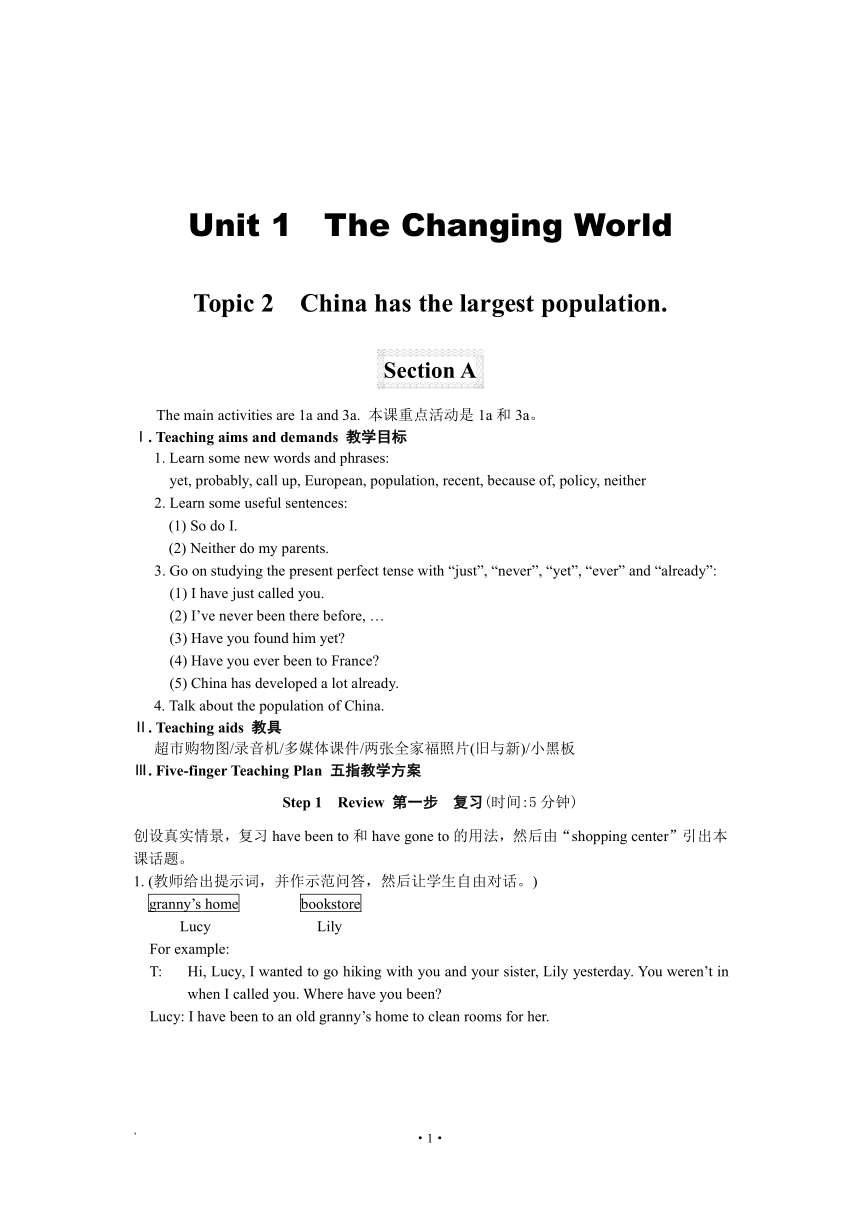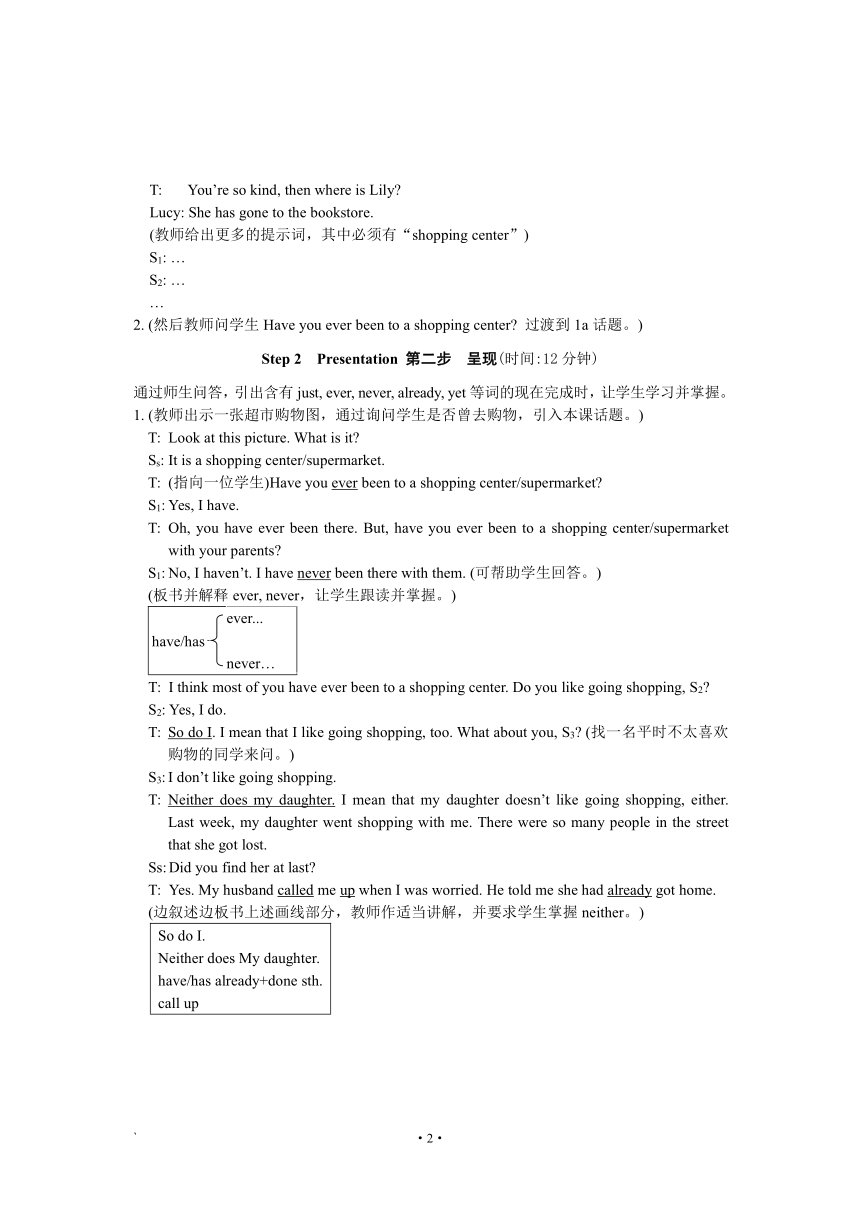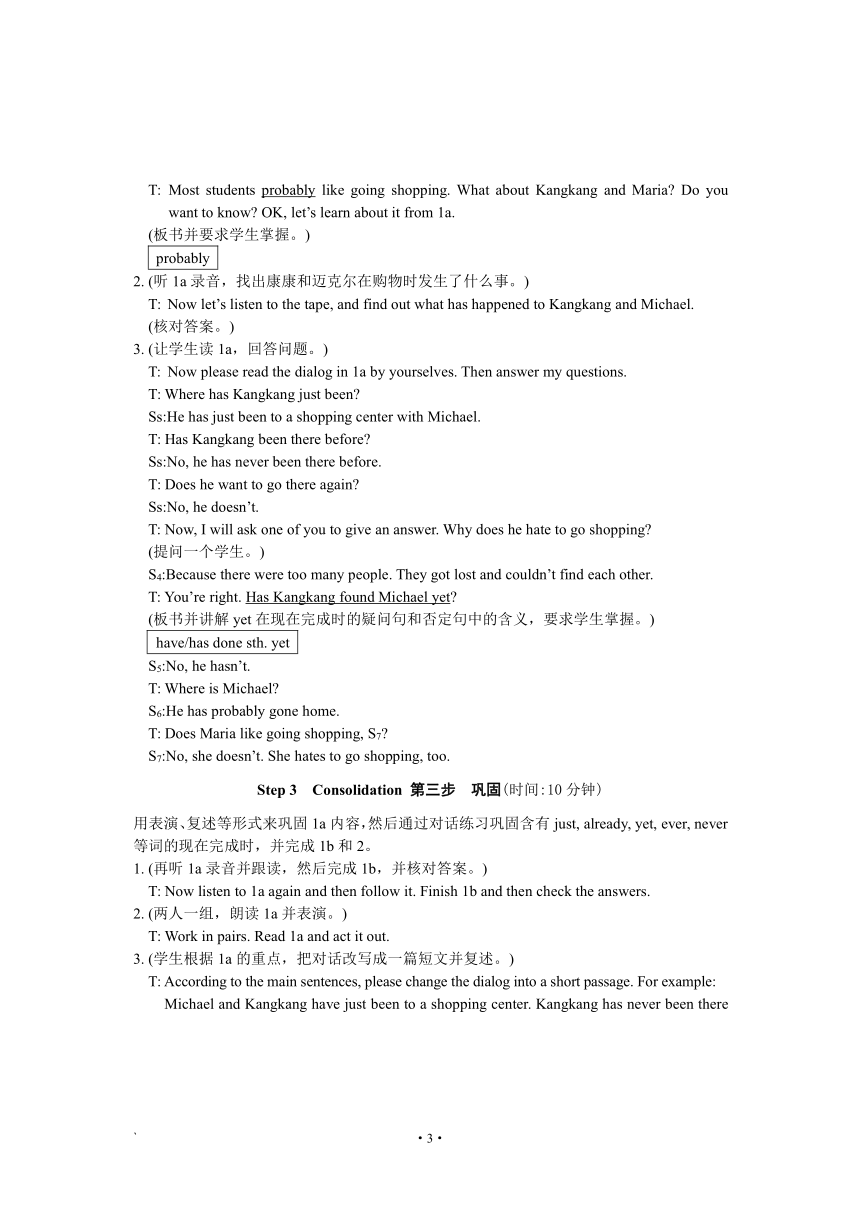UNIT1The Developing World TOPIC2 What has happened to the population? SectionA
文档属性
| 名称 | UNIT1The Developing World TOPIC2 What has happened to the population? SectionA |  | |
| 格式 | rar | ||
| 文件大小 | 169.0KB | ||
| 资源类型 | 教案 | ||
| 版本资源 | 仁爱科普版 | ||
| 科目 | 英语 | ||
| 更新时间 | 2010-09-06 18:38:00 | ||
图片预览



文档简介
Unit 1 The Changing World
Topic 2 China has the largest population.
Section A
The main activities are 1a and 3a. 本课重点活动是1a和3a。
Ⅰ. Teaching aims and demands 教学目标
1. Learn some new words and phrases:
yet, probably, call up, European, population, recent, because of, policy, neither
2. Learn some useful sentences:
(1) So do I.
(2) Neither do my parents.
3. Go on studying the present perfect tense with “just”, “never”, “yet”, “ever” and “already”:
(1) I have just called you.
(2) I’ve never been there before, …
(3) Have you found him yet
(4) Have you ever been to France
(5) China has developed a lot already.
4. Talk about the population of China.
Ⅱ. Teaching aids 教具
超市购物图/录音机/多媒体课件/两张全家福照片(旧与新)/小黑板
Ⅲ. Five-finger Teaching Plan 五指教学方案
Step 1 Review 第一步 复习(时间:5分钟)
创设真实情景,复习have been to和have gone to的用法,然后由“shopping center”引出本课话题。
1. (教师给出提示词,并作示范问答,然后让学生自由对话。)
granny’s home bookstore
Lucy Lily
For example:
T: Hi, Lucy, I wanted to go hiking with you and your sister, Lily yesterday. You weren’t in when I called you. Where have you been
Lucy: I have been to an old granny’s home to clean rooms for her.
T: You’re so kind, then where is Lily
Lucy: She has gone to the bookstore.
(教师给出更多的提示词,其中必须有“shopping center”)
S1: …
S2: …
…
2. (然后教师问学生Have you ever been to a shopping center 过渡到1a话题。)
Step 2 Presentation 第二步 呈现(时间:12分钟)
通过师生问答,引出含有just, ever, never, already, yet等词的现在完成时,让学生学习并掌握。
1. (教师出示一张超市购物图,通过询问学生是否曾去购物,引入本课话题。)
T: Look at this picture. What is it
Ss: It is a shopping center/supermarket.
T: (指向一位学生)Have you ever been to a shopping center/supermarket
S1: Yes, I have.
T: Oh, you have ever been there. But, have you ever been to a shopping center/supermarket with your parents
S1: No, I haven’t. I have never been there with them. (可帮助学生回答。)
(板书并解释ever, never,让学生跟读并掌握。)
T: I think most of you have ever been to a shopping center. Do you like going shopping, S2
S2: Yes, I do.
T: So do I. I mean that I like going shopping, too. What about you, S3 (找一名平时不太喜欢购物的同学来问。)
S3: I don’t like going shopping.
T: Neither does my daughter. I mean that my daughter doesn’t like going shopping, either. Last week, my daughter went shopping with me. There were so many people in the street that she got lost.
Ss: Did you find her at last
T: Yes. My husband called me up when I was worried. He told me she had already got home.
(边叙述边板书上述画线部分,教师作适当讲解,并要求学生掌握neither。)
So do I.Neither does My daughter.have/has already+done sth.call up
T: Most students probably like going shopping. What about Kangkang and Maria Do you want to know OK, let’s learn about it from 1a.
(板书并要求学生掌握。)
probably
2. (听1a录音,找出康康和迈克尔在购物时发生了什么事。)
T: Now let’s listen to the tape, and find out what has happened to Kangkang and Michael.
(核对答案。)
3. (让学生读1a,回答问题。)
T: Now please read the dialog in 1a by yourselves. Then answer my questions.
T: Where has Kangkang just been
Ss:He has just been to a shopping center with Michael.
T: Has Kangkang been there before
Ss:No, he has never been there before.
T: Does he want to go there again
Ss:No, he doesn’t.
T: Now, I will ask one of you to give an answer. Why does he hate to go shopping
(提问一个学生。)
S4 :Because there were too many people. They got lost and couldn’t find each other.
T: You’re right. Has Kangkang found Michael yet
(板书并讲解yet在现在完成时的疑问句和否定句中的含义,要求学生掌握。)
have/has done sth. yet
S5:No, he hasn’t.
T: Where is Michael
S6:He has probably gone home.
T: Does Maria like going shopping, S7
S7:No, she doesn’t. She hates to go shopping, too.
Step 3 Consolidation 第三步 巩固(时间:10分钟)
用表演、复述等形式来巩固1a内容,然后通过对话练习巩固含有just, already, yet, ever, never等词的现在完成时,并完成1b和2。
1. (再听1a录音并跟读,然后完成1b,并核对答案。)
T: Now listen to 1a again and then follow it. Finish 1b and then check the answers.
2. (两人一组,朗读1a并表演。)
T: Work in pairs. Read 1a and act it out.
3. (学生根据1a的重点,把对话改写成一篇短文并复述。)
T: According to the main sentences, please change the dialog into a short passage. For example:
Michael and Kangkang have just been to a shopping center. Kangkang has never been there before. In the shopping center, there were too many people. They got lost and couldn’t find each other. And at last Kangkang thought that Michael had probably gone home. Kangkang doesn’t want to go shopping again.
4. (1)(让学生独立完成2,掌握just, already, yet, ever, never在现在完成时中的用法及含义。)
T: I’ve never been to any European countries. But Michael has been there. Do you want to know more about him Please finish 2. Then check the answers together.
(板书并要求学生掌握。)
European
(2)(完成2后,练习2并编一个相似对话,巩固练习just, already, yet, ever, never等词的用法。)
T: Make up a similar dialog with just, already, yet, ever, and never.
A: Have you been to Egypt
B: No, I’ve been to any African countries. But Mike has come back from Egypt. He likes it very much. He says he has seen such a beautiful country before.
A: Have you seen him
B: Yes, I have seen him .
Step 4 Practice 第四步 练习(时间:12分钟)
继续谈论Kangkang不愿意去购物中心的原因,引出并谈论中国的人口变化,呈现3a中的生词、短语和重点语言项目,然后完成3b,巩固3a内容。
T: Why does Kangkang hate to go shopping
Ss: Because there are too many people.
T: Yes. There are so many people in China. By the way, S1, how many people are there in your family
S1: Three, my father, my mother and I.
T: But when I was a child, most families in our country had at least three or four children. Now, here are two pictures of Kangkang’s family. Look carefully and find out the differences between them.
1. (把事先准备好的两张康康家的照片,用多媒体展示在大屏幕上。)
(播放3a录音,让学生听一遍课文。然后与学生一起讨论,引出3a。)
T: Now let’s talk about the two pictures.
T: How many people are there in Picture One
Ss: There are three.
T: Yes. It’s a nice photo. Kangkang was so cute then. Is it a big family
Ss: No, it isn’t.
T: And it’s a nuclear family. Please look at Picture Two. Is it a big family
Ss: Yes, it is very big. And it’s an extended family.
T: It seems that their living conditions were not very good. It’s a photo of Kangkang’s father’s family. At that time, most families in our country had at least three or four children. China had the largest population in the world.
(教师板书It seems that…,要求学生掌握此句型,并注意和seem to的转换联系。板书并要求学生掌握population。)
populationseem to…It seems that…
T: Most families have only one child now. Do you know why
Ss: No, we don’t know.
T: Because China has carried out one-child policy to control the population.
(板书并要求学生掌握。)
policy
T: Because of our country’s one-child policy, great changes have taken place in China in recent years.
(板书并要求学生掌握。)
because of, recent
2. (让学生阅读3a,画出同3b中所给例句意思相似的句子,完成3b。)
T: Read 3a and underline the sentences which have similar meanings as the sentences below.
3. (让学生听3a录音并跟读。)
T: Listen to 3a and follow it.
Step 5 Project 第五步 综合探究活动(时间:6分钟)
给出一些有关人口的话题,让学生分组讨论,然后写出一篇汇报或作文,尽量用上含有just, already, yet, never, ever等词的现在完成时。让学生尽可能多地了解我国的人口现状,为下一课作准备。
1. (教师用小黑板呈现本课出现的主要话题。)
T: Please discuss these topics:
(出示小黑板。)
(1) The population problem(2) One-child policy(3) Little Emperors
(学生自己选一个话题,两人一组进行讨论。讨论完毕,选几组做汇报。鼓励学生发表自己的见解,尊重学生的个性发展,并体现激励机制。)
Example:
Boys and girls,
We have just learned something about the population of China. Have you ever thought about it before Before this class, I think most of you have already known some about it. …
2. Homework:
(1) Choose one of the topics above. Talk about it and write a composition.
(2) Make five sentences. Use the present perfect tense with the words “just”, “already”, “yet”, “ever”, “never”.
板书设计:
China has the largest population.Section Acall up everSo do I. never Neither do my parents. already just Have/Has … done … yet It seems that… I don’t think…
+ done sth.
ever...
never…
have/has
have/has
PAGE
·1·
`
Topic 2 China has the largest population.
Section A
The main activities are 1a and 3a. 本课重点活动是1a和3a。
Ⅰ. Teaching aims and demands 教学目标
1. Learn some new words and phrases:
yet, probably, call up, European, population, recent, because of, policy, neither
2. Learn some useful sentences:
(1) So do I.
(2) Neither do my parents.
3. Go on studying the present perfect tense with “just”, “never”, “yet”, “ever” and “already”:
(1) I have just called you.
(2) I’ve never been there before, …
(3) Have you found him yet
(4) Have you ever been to France
(5) China has developed a lot already.
4. Talk about the population of China.
Ⅱ. Teaching aids 教具
超市购物图/录音机/多媒体课件/两张全家福照片(旧与新)/小黑板
Ⅲ. Five-finger Teaching Plan 五指教学方案
Step 1 Review 第一步 复习(时间:5分钟)
创设真实情景,复习have been to和have gone to的用法,然后由“shopping center”引出本课话题。
1. (教师给出提示词,并作示范问答,然后让学生自由对话。)
granny’s home bookstore
Lucy Lily
For example:
T: Hi, Lucy, I wanted to go hiking with you and your sister, Lily yesterday. You weren’t in when I called you. Where have you been
Lucy: I have been to an old granny’s home to clean rooms for her.
T: You’re so kind, then where is Lily
Lucy: She has gone to the bookstore.
(教师给出更多的提示词,其中必须有“shopping center”)
S1: …
S2: …
…
2. (然后教师问学生Have you ever been to a shopping center 过渡到1a话题。)
Step 2 Presentation 第二步 呈现(时间:12分钟)
通过师生问答,引出含有just, ever, never, already, yet等词的现在完成时,让学生学习并掌握。
1. (教师出示一张超市购物图,通过询问学生是否曾去购物,引入本课话题。)
T: Look at this picture. What is it
Ss: It is a shopping center/supermarket.
T: (指向一位学生)Have you ever been to a shopping center/supermarket
S1: Yes, I have.
T: Oh, you have ever been there. But, have you ever been to a shopping center/supermarket with your parents
S1: No, I haven’t. I have never been there with them. (可帮助学生回答。)
(板书并解释ever, never,让学生跟读并掌握。)
T: I think most of you have ever been to a shopping center. Do you like going shopping, S2
S2: Yes, I do.
T: So do I. I mean that I like going shopping, too. What about you, S3 (找一名平时不太喜欢购物的同学来问。)
S3: I don’t like going shopping.
T: Neither does my daughter. I mean that my daughter doesn’t like going shopping, either. Last week, my daughter went shopping with me. There were so many people in the street that she got lost.
Ss: Did you find her at last
T: Yes. My husband called me up when I was worried. He told me she had already got home.
(边叙述边板书上述画线部分,教师作适当讲解,并要求学生掌握neither。)
So do I.Neither does My daughter.have/has already+done sth.call up
T: Most students probably like going shopping. What about Kangkang and Maria Do you want to know OK, let’s learn about it from 1a.
(板书并要求学生掌握。)
probably
2. (听1a录音,找出康康和迈克尔在购物时发生了什么事。)
T: Now let’s listen to the tape, and find out what has happened to Kangkang and Michael.
(核对答案。)
3. (让学生读1a,回答问题。)
T: Now please read the dialog in 1a by yourselves. Then answer my questions.
T: Where has Kangkang just been
Ss:He has just been to a shopping center with Michael.
T: Has Kangkang been there before
Ss:No, he has never been there before.
T: Does he want to go there again
Ss:No, he doesn’t.
T: Now, I will ask one of you to give an answer. Why does he hate to go shopping
(提问一个学生。)
S4 :Because there were too many people. They got lost and couldn’t find each other.
T: You’re right. Has Kangkang found Michael yet
(板书并讲解yet在现在完成时的疑问句和否定句中的含义,要求学生掌握。)
have/has done sth. yet
S5:No, he hasn’t.
T: Where is Michael
S6:He has probably gone home.
T: Does Maria like going shopping, S7
S7:No, she doesn’t. She hates to go shopping, too.
Step 3 Consolidation 第三步 巩固(时间:10分钟)
用表演、复述等形式来巩固1a内容,然后通过对话练习巩固含有just, already, yet, ever, never等词的现在完成时,并完成1b和2。
1. (再听1a录音并跟读,然后完成1b,并核对答案。)
T: Now listen to 1a again and then follow it. Finish 1b and then check the answers.
2. (两人一组,朗读1a并表演。)
T: Work in pairs. Read 1a and act it out.
3. (学生根据1a的重点,把对话改写成一篇短文并复述。)
T: According to the main sentences, please change the dialog into a short passage. For example:
Michael and Kangkang have just been to a shopping center. Kangkang has never been there before. In the shopping center, there were too many people. They got lost and couldn’t find each other. And at last Kangkang thought that Michael had probably gone home. Kangkang doesn’t want to go shopping again.
4. (1)(让学生独立完成2,掌握just, already, yet, ever, never在现在完成时中的用法及含义。)
T: I’ve never been to any European countries. But Michael has been there. Do you want to know more about him Please finish 2. Then check the answers together.
(板书并要求学生掌握。)
European
(2)(完成2后,练习2并编一个相似对话,巩固练习just, already, yet, ever, never等词的用法。)
T: Make up a similar dialog with just, already, yet, ever, and never.
A: Have you been to Egypt
B: No, I’ve been to any African countries. But Mike has come back from Egypt. He likes it very much. He says he has seen such a beautiful country before.
A: Have you seen him
B: Yes, I have seen him .
Step 4 Practice 第四步 练习(时间:12分钟)
继续谈论Kangkang不愿意去购物中心的原因,引出并谈论中国的人口变化,呈现3a中的生词、短语和重点语言项目,然后完成3b,巩固3a内容。
T: Why does Kangkang hate to go shopping
Ss: Because there are too many people.
T: Yes. There are so many people in China. By the way, S1, how many people are there in your family
S1: Three, my father, my mother and I.
T: But when I was a child, most families in our country had at least three or four children. Now, here are two pictures of Kangkang’s family. Look carefully and find out the differences between them.
1. (把事先准备好的两张康康家的照片,用多媒体展示在大屏幕上。)
(播放3a录音,让学生听一遍课文。然后与学生一起讨论,引出3a。)
T: Now let’s talk about the two pictures.
T: How many people are there in Picture One
Ss: There are three.
T: Yes. It’s a nice photo. Kangkang was so cute then. Is it a big family
Ss: No, it isn’t.
T: And it’s a nuclear family. Please look at Picture Two. Is it a big family
Ss: Yes, it is very big. And it’s an extended family.
T: It seems that their living conditions were not very good. It’s a photo of Kangkang’s father’s family. At that time, most families in our country had at least three or four children. China had the largest population in the world.
(教师板书It seems that…,要求学生掌握此句型,并注意和seem to的转换联系。板书并要求学生掌握population。)
populationseem to…It seems that…
T: Most families have only one child now. Do you know why
Ss: No, we don’t know.
T: Because China has carried out one-child policy to control the population.
(板书并要求学生掌握。)
policy
T: Because of our country’s one-child policy, great changes have taken place in China in recent years.
(板书并要求学生掌握。)
because of, recent
2. (让学生阅读3a,画出同3b中所给例句意思相似的句子,完成3b。)
T: Read 3a and underline the sentences which have similar meanings as the sentences below.
3. (让学生听3a录音并跟读。)
T: Listen to 3a and follow it.
Step 5 Project 第五步 综合探究活动(时间:6分钟)
给出一些有关人口的话题,让学生分组讨论,然后写出一篇汇报或作文,尽量用上含有just, already, yet, never, ever等词的现在完成时。让学生尽可能多地了解我国的人口现状,为下一课作准备。
1. (教师用小黑板呈现本课出现的主要话题。)
T: Please discuss these topics:
(出示小黑板。)
(1) The population problem(2) One-child policy(3) Little Emperors
(学生自己选一个话题,两人一组进行讨论。讨论完毕,选几组做汇报。鼓励学生发表自己的见解,尊重学生的个性发展,并体现激励机制。)
Example:
Boys and girls,
We have just learned something about the population of China. Have you ever thought about it before Before this class, I think most of you have already known some about it. …
2. Homework:
(1) Choose one of the topics above. Talk about it and write a composition.
(2) Make five sentences. Use the present perfect tense with the words “just”, “already”, “yet”, “ever”, “never”.
板书设计:
China has the largest population.Section Acall up everSo do I. never Neither do my parents. already just Have/Has … done … yet It seems that… I don’t think…
+ done sth.
ever...
never…
have/has
have/has
PAGE
·1·
`
同课章节目录
- Unit 1 The Changing World
- Topic 1 Our country has developed rapidly.
- Topic 2 The population in developing countries is
- Topic 3 The world has changed for the better.
- Unit 2 Saving the earth.
- Topic 1 Pollution has causes too many problems.
- Topic 2 All these problems are very serious.
- Topic 3 What can we do to protect the environment
- Unit 3 English around the World
- Topic 1 English is widely spoken around the world.
- Topic 2 Some things usually have different meaning
- Topic 3 Could you give us some advice on how to l
- Unit 4 Amazing Science
- Topic 1 When was it invented?
- Topic 2 I'm excited about the things that will be
- Topic 3 China is the third nation that sent a pers
